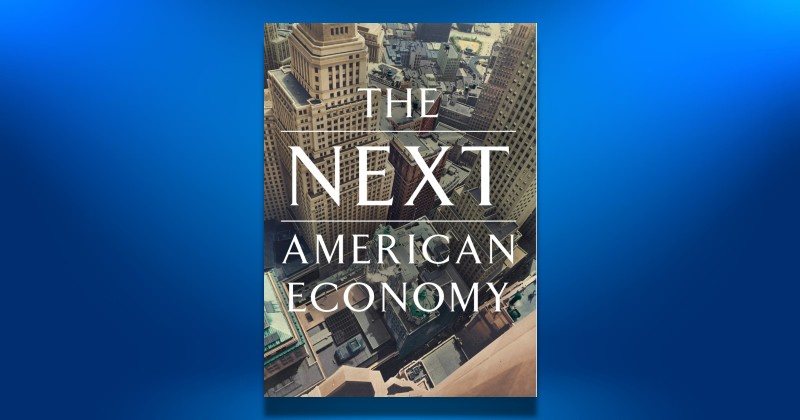The following is an extract from Samuel Gregg’s “The Next American Economy: Nation, State, and Markets in an Uncertain World” (New York: Encounter Books, 2022).
More than one person has remarked upon the providential character of one of the most important books ever written, “The Wealth of Nations”, being published the same year as that most consequential of modern political statements: the Declaration of Independence. The book’s author, Adam Smith, widely regarded as the father of modern economics and the first great theorist of how a modern capitalist economy and commercial society should work, paid attention to what was transpiring in Britain’s North American colonies. He even ventured that giving the colonies their independence might ensure that the tensions between them and Britain around the issues of taxation, trade, and sovereignty did not spill over into outright war.
Smith believed that a great future lay before the colonies. He also recognized the ambition of America’s Founders to create a new type of polity. So it was that, following the American Revolution and the Constitution’s eventual drafting and ratification, the new country quickly emerged in the 1790s as a republic committed to constitutional government and in which social life as well as domestic and foreign policy was heavily influenced by business and trade. A century later, America surpassed Britain to become the world’s biggest economy
Few countries have been as defined by the character of their economy as the United States. To the world, America has come to mean capitalism. There have been occasions in America’s history, however, when that economy came asunder. The Great Depression, for example, brought America to its economic knees and resulted in one of the federal government’s greatest peacetime extensions into the economy in the form of the New Deal.
Cataclysmic events like the Depression leave an impression. Rightly or wrongly, narratives develop which become difficult to displace. This was certainly the case with the 2008 financial crisis and the subsequent global economic downturn known today as the Great Recession. The images of Alan Greenspan, the retired Chair of the Federal Reserve famed for his confidence in the power of markets, testifying before Congress that those same markets had broken down in the wake of a crisis emanating from the financial sector, shocked Americans. The reputational damage done to free markets proceeding from the freezing-up of credit markets, the plunging of stock and housing prices, and a sharp uptick in unemployment was incalculable. It also induced a great deal of soul-searching among Americans about the future character of the U.S. economy. The sight of the federal government and the Federal Reserve bailing out major banks and businesses and thereby (or so many believed) saving American capitalism from collapse created space for many to argue that this latest expansion of the state into the economy vindicated the need for government to take on more expansive roles in American economic life on a more permanent basis.
Doubts and debates about the future of American capitalism were not confined to the United States’ shores. The Chinese political philosopher Jiwei Ci suggests that the financial crisis and America’s struggle to get it under control left an impression upon many senior Chinese government officials. Questions were raised in their minds about whether America would remain the world’s economic superpower, what that meant for China’s limited opening to commercial freedom, and how China should deal with America and the world in general. Former paramount leader Deng Xiaoping’s insistence that “hiding strengths, biding time” was necessary to ensure that China’s rise did not alarm other nations now seemed dated. For many Chinese leaders, the biding of time was over. It was time for assertion.
Viewed from this perspective, domestic economic problems in America helped spark new challenges from abroad. But they have also led to a sustained and often polemical debate about America’s economic future that shattered assumptions which had been in place since the 1980s about who stood where on matters of economic policy, and why they did so. The political landscape that will eventually emerge from the sharpening of these disputes in our time is by no means certain.
To my mind, the future for the American economy amounts to a choice between two general systems. The first is what I will call a form of “state capitalism ” .
State capitalism has been used to describe systems ranging from command economies in which the government controls most businesses, to situations in which the government dominates the allocation of credit throughout the economy. Broadly speaking, the state capitalism that I have in mind is an economy in which the government, often with the aid of experts and technocrats and sometimes in partnership with different interest groups, engages in extensive interventions into the economy from the top down. The goal is not to extinguish private property and free exchange. Rather it is to shape and even direct many activities within the economy through state action to realize very specific economic and political objectives.
This type of state capitalism as it manifests itself in America is particularly focused on achieving greater economic security for specific groups. A certain degree of such security provided by the state, it is held, is something that any self-respecting nation morally owes to all its citizens, whether as a matter of solidarity between fellow Americans or by reference to a social compact. Markets, we are told, do not adequately meet some communities’ economic needs and, in some instances, are undermining their well-being. That emphasis on security also extends to foreign affairs. The U.S. government, it is held, must act to ensure that our economy enhances rather than undermines national security. The means for realizing these domestic and geopolitical ends include protectionist measures, the use of industrial policy, and mandating particular ways in which businesses, other social groups, and the state should interact.
The alternative choice to this form of state capitalism in America today is a free market economy. By this, however, I have something quite specific in mind, which includes but extends beyond the classic economic arguments for markets. My thesis is that making the case for free markets in twenty-first-century America must involve rooting such an economy in what some of its most influential Founders thought should be America’s political destiny: that is, a modern commercial republic. Politically, this ideal embodies the idea of a self-governing sovereign state in which the governed are regularly consulted; in which the use of state power is limited by strong commitments to constitutionalism, the rule of law, and private property rights; and whose citizens consciously embrace the specific habits and disciplines needed to sustain such a republic. These settings complement and support an economy characterized by powerful bottom-up entrepreneurial drives and in which businesses are constantly exposed to the discipline of consumer preferences expressed through open and free competition. The citizens of this republic also trade freely with each other and the rest of the world while being fully cognizant that there are no utopias in this life, particularly in the realm of foreign affairs.
Like the state capitalism option, this set of political and economic arrangements is underpinned by particular normative commitments. One is to freedom and an emphasis on the idea that justice involves limiting arbitrary power. Another is the conviction that the spread of dynamic commerce is central (though insufficient) to the advancement of important virtues and civilization more generally.
Granted, there are varying ways in which each of these two alternatives can be expressed. Nonetheless I believe that America faces a basic choice between a form of state capitalism and the type of market economy outlined in these pages. This need for Americans to make such a decision about its economic future did not emerge from a void. To grasp the “hows” and “whys” underlying these circumstances, we need to go back to a different time: one in which America and the world rediscovered free markets.
Samuel Gregg is Distinguished Fellow in Political Economy and Senior Research Faculty at the American Institute for Economic Research, and a research fellow at the Acton Institute. This article was originally published by RealClearBooks and made available via
RealClearWire.







